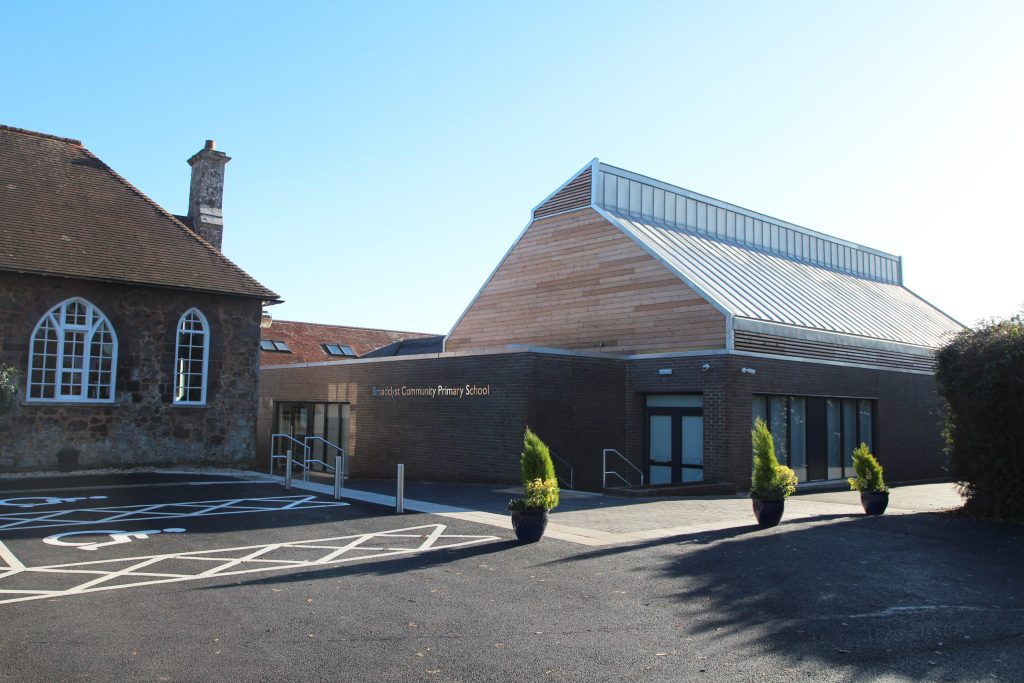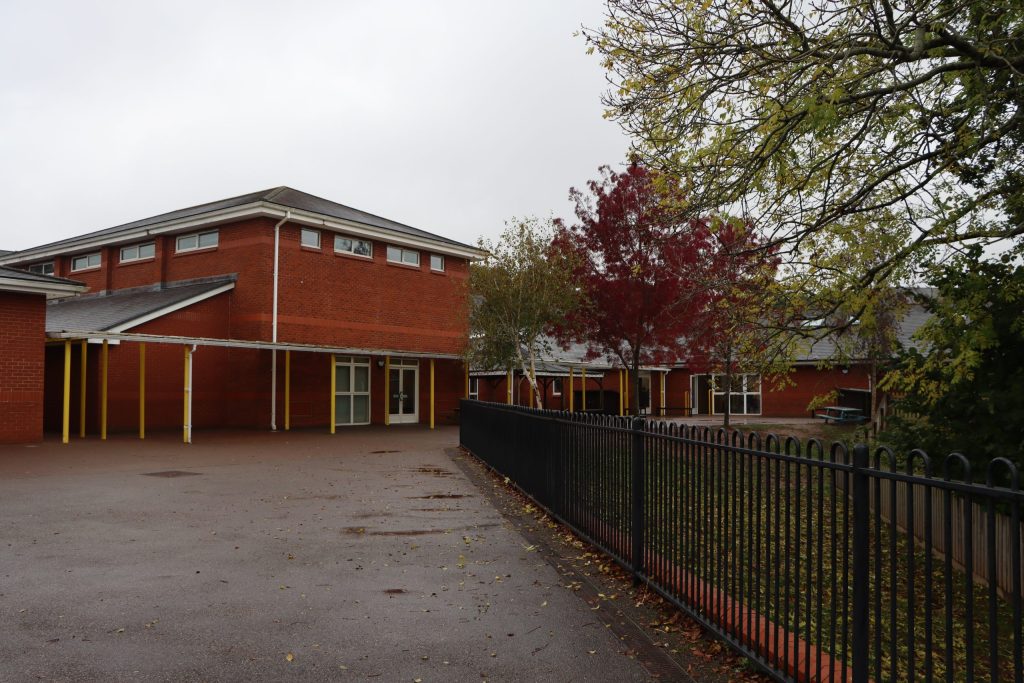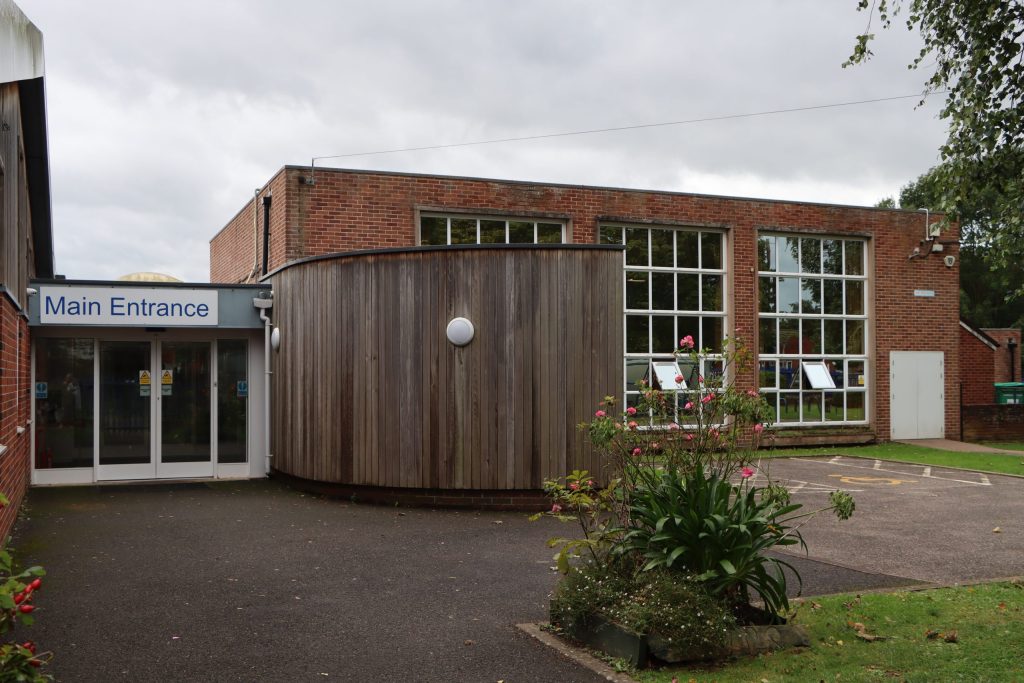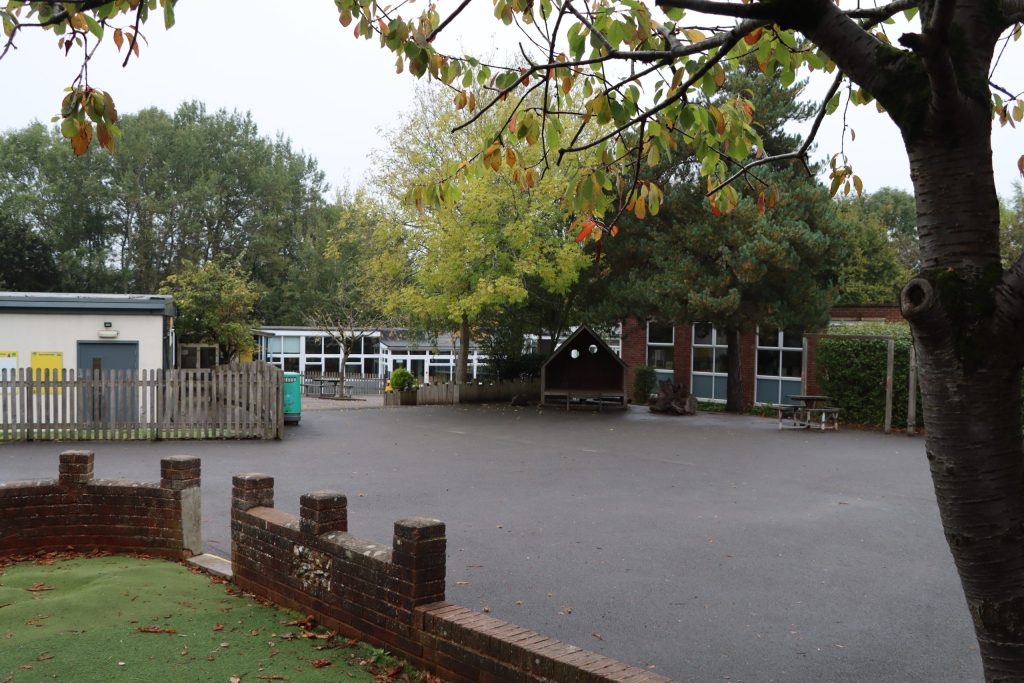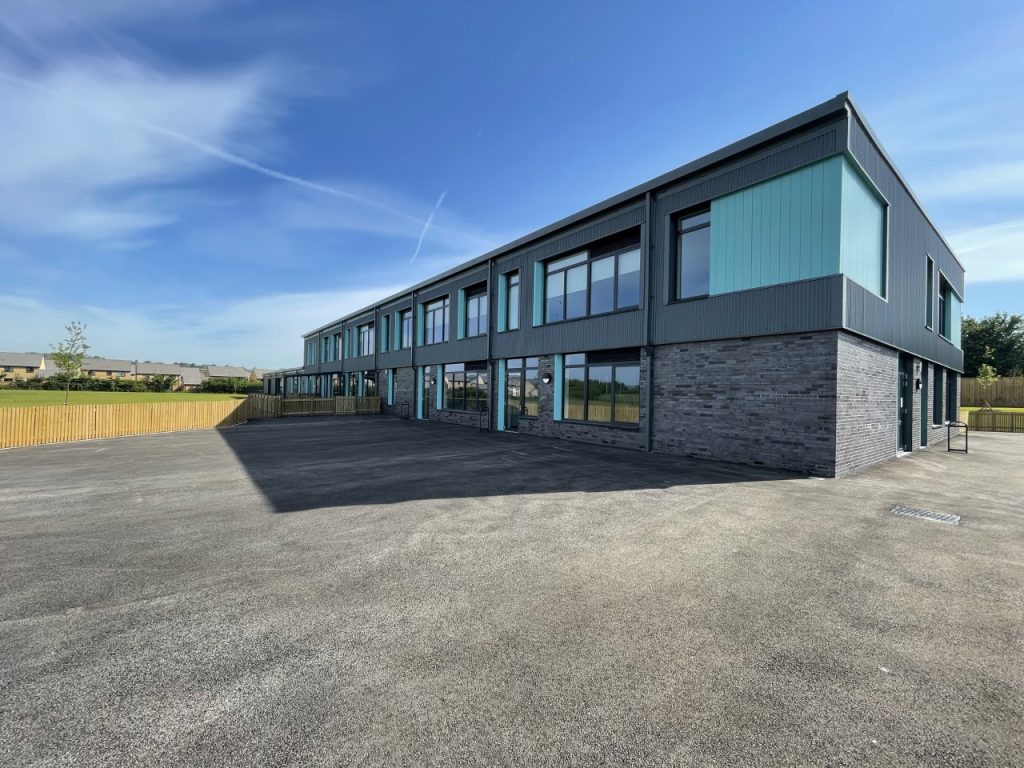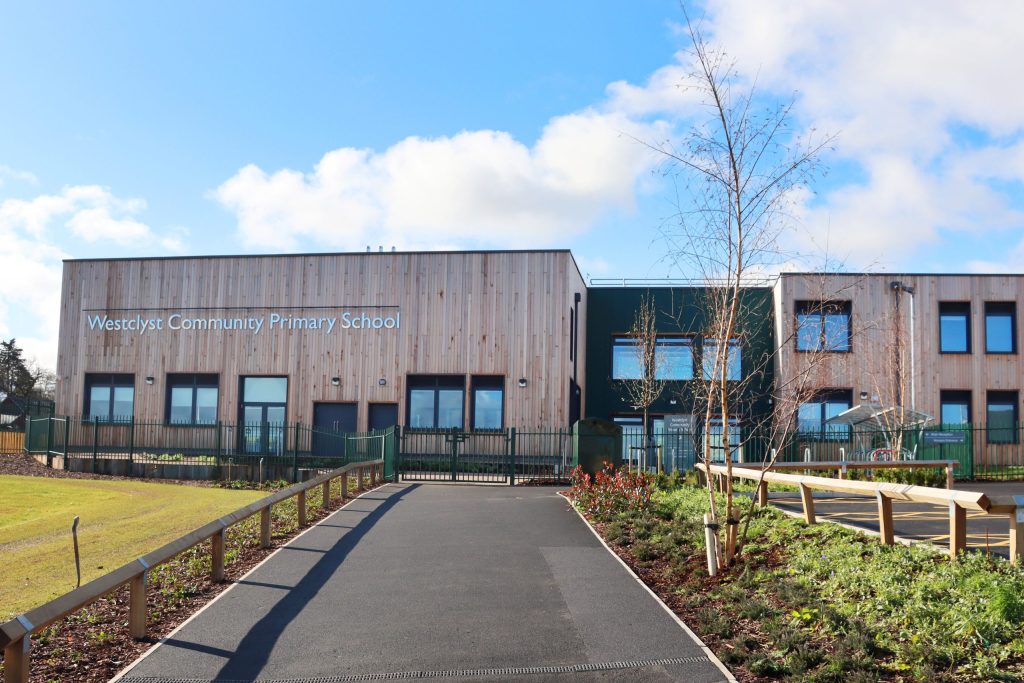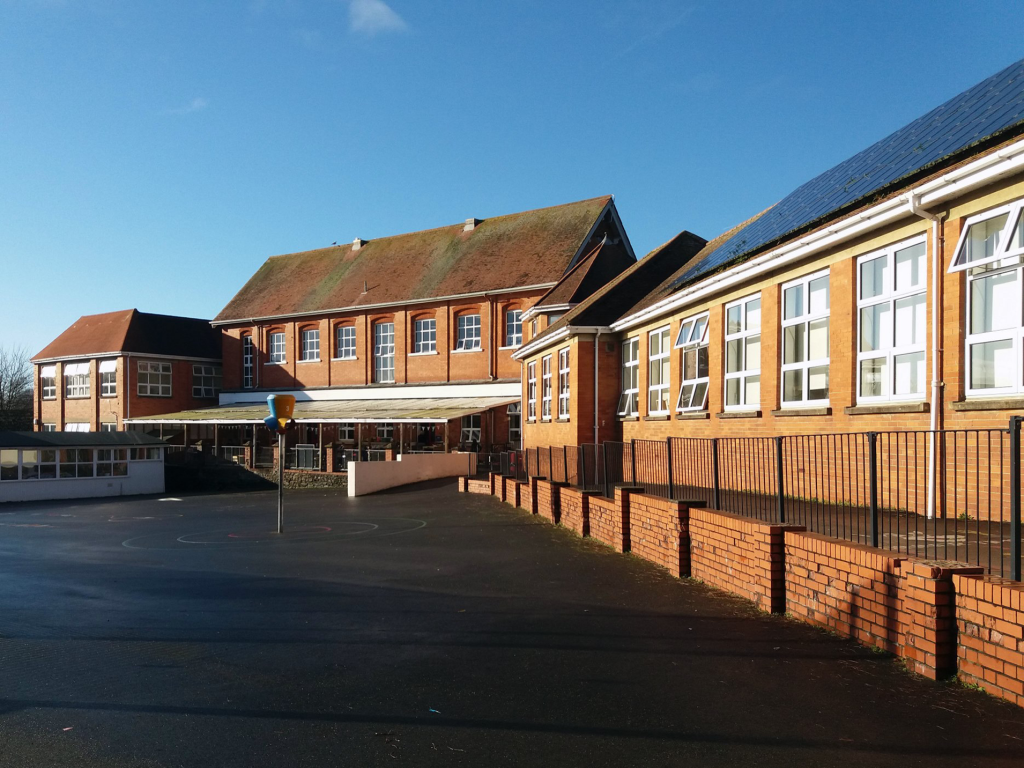Drama
Drama across our Trust is a creative and collaborative subject that inspires every child to express themselves, communicate confidently, and work as part of a team. Our approach is rooted in storytelling, character exploration, and performance, giving pupils the chance to develop their imagination and empathy in a supportive environment. Drama is woven throughout the curriculum, enriching learning across subjects and helping children to make sense of the world around them.
Children regularly have the opportunity to perform for an audience, whether in school or at local theatres, and to work together on scripts, presentations, and creative projects. These experiences foster resilience, creativity, and a love of performance, ensuring that all pupils leave our Trust with the confidence to communicate, collaborate, and embrace new challenges—both on stage and beyond.
Nursery
In Nursery, pupils begin to explore drama through imaginative play and storytelling. They use props, puppets, and costumes to act out familiar tales and invent their own stories. Through role play, children take on different characters, express emotions, and use their voices and bodies to communicate ideas. These playful experiences help build confidence, language skills, and creativity. Drama is naturally embedded in daily routines and linked to story time, encouraging children to explore the world around them through expressive and collaborative play.
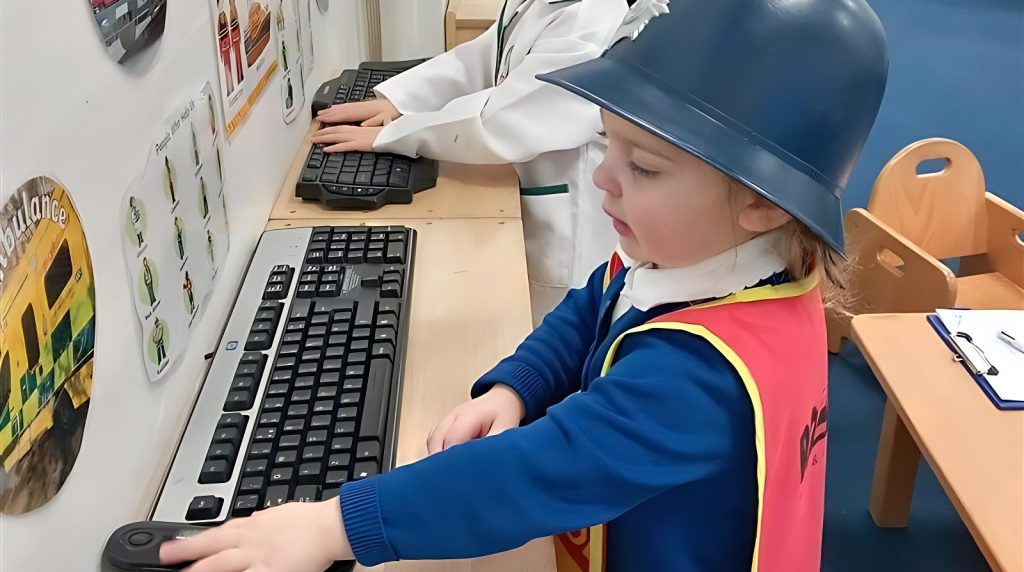
Expressive Arts and Design
The development of children’s artistic and cultural awareness supports their imagination and creativity. It is important that children have regular opportunities to engage with the arts, enabling them to explore and play with a wide range of media and materials. The quality and variety of what children see, hear and participate in is crucial for developing their understanding, self-expression, vocabulary and ability to communicate through the arts. The frequency, repetition and depth of their experiences are fundamental to their progress in interpreting and appreciating what they hear, respond to and observe.
Reception
In Reception, pupils build on their early drama experiences by taking part in more structured storytelling and performance activities. They explore characters and settings through role play, act out familiar stories, and use expressive language to bring narratives to life. A highlight of the year is their participation in the school Nativity performance, where children perform for an audience, developing confidence, teamwork, and a sense of achievement. Drama is also used across the curriculum to support learning in literacy, PSHE, and topic work, helping children to express themselves and deepen their understanding through creative exploration.
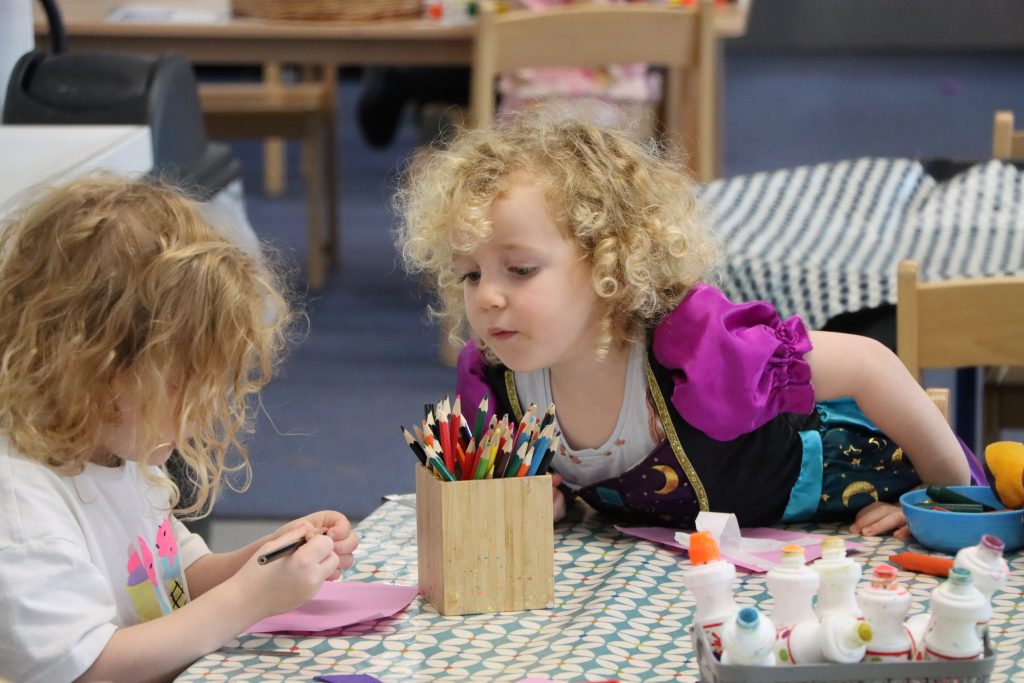
Expressive Arts and Design
The development of children’s artistic and cultural awareness supports their imagination and creativity. It is important that children have regular opportunities to engage with the arts, enabling them to explore and play with a wide range of media and materials. The quality and variety of what children see, hear and participate in is crucial for developing their understanding, self-expression, vocabulary and ability to communicate through the arts. The frequency, repetition and depth of their experiences are fundamental to their progress in interpreting and appreciating what they hear, respond to and observe.
Year 1
In Year 1, drama is used to enrich learning across the curriculum, helping children develop confidence, creativity, and communication. As part of the Caring for Others project, children take on the role of responsible pet owners—caring for a jelly baby and persuading school leaders they’re ready to look after the school dog. In the Frozen Planet topic, they imagine discovering an unexpected visitor in their garden and write letters to Greenpeace, using drama to explore emotions and environmental responsibility. Later in the year, children perform their own stories during a Tudor-style banquet, entertaining Reception with expressive storytelling and character voices.
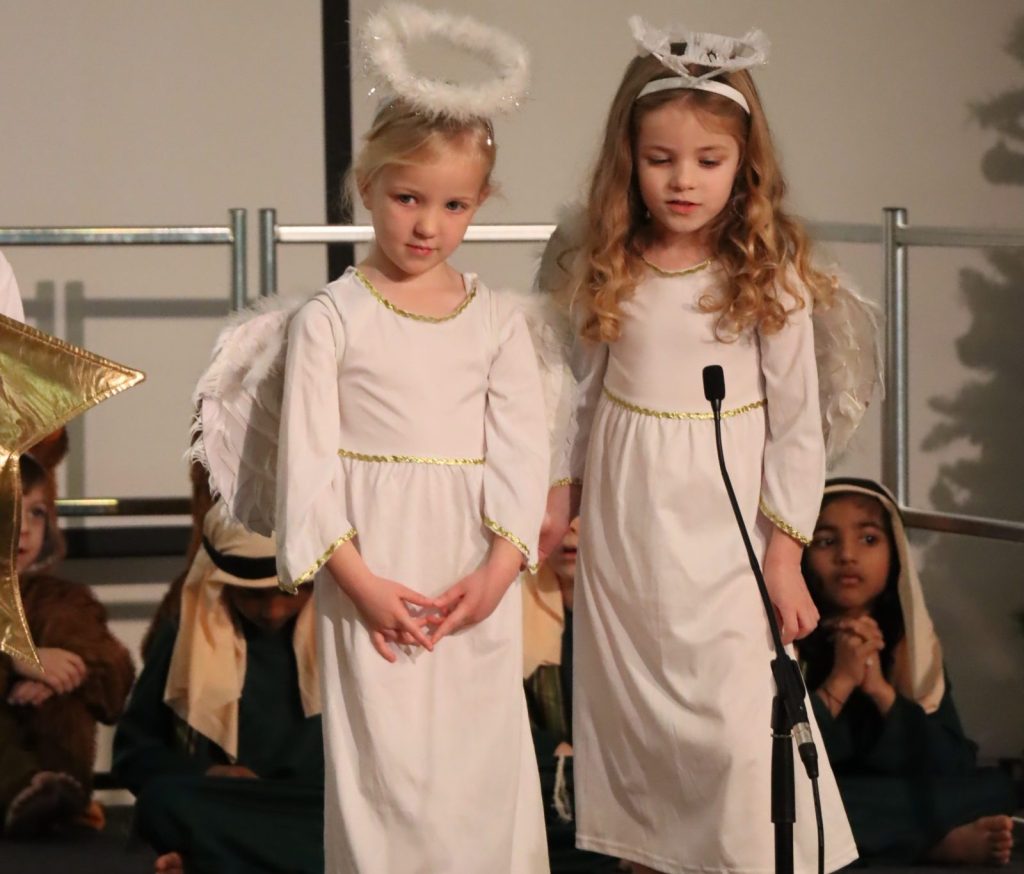
- Use voice, facial expression, and movement to bring characters to life in storytelling and role-play
- Perform short scenes and stories with a clear beginning, middle, and end
- Take on roles from familiar stories and historical contexts (e.g. Tudor banquet performance)
- Explore emotions and actions through improvisation and guided play
- Practise speaking clearly and confidently in front of an audience
- Listen and respond to others in character during group performances
- Rehearse and perform in the Nativity, learning lines, songs, and stage directions
- Work collaboratively to present a festive production to an audience
Year 2
In Year 2, drama is woven into learning across the curriculum, giving children opportunities to perform, express themselves, and build confidence. Early in the year, children take on dramatic roles as they perform their Great Fire of London diary entries in the school TV studio, bringing history to life through expressive storytelling and role play. Later, they explore character and narrative by retelling and performing fairy tales, culminating in the creation of their own story to send to Blue Peter. Drama also supports emotional development through dance and movement, where children respond to music and stories like Mini Rabbit, Not Lost and Kitchen Disco.
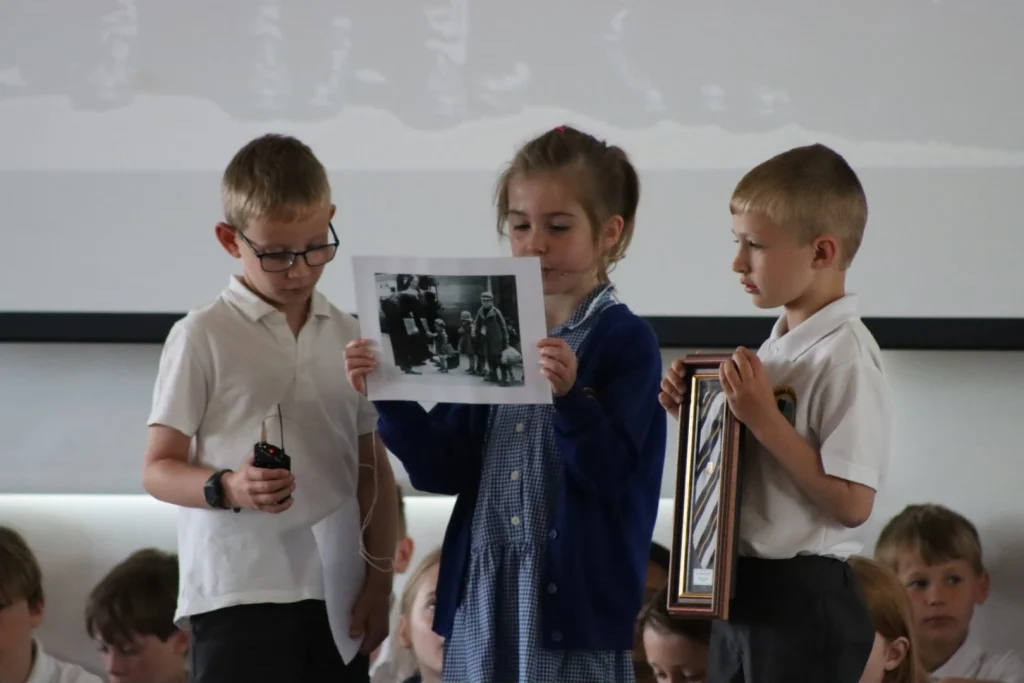
- Develop expressive skills through performance of diary entries, interviews, and storytelling
- Use tone, pace, and gesture to enhance dramatic effect
- Explore historical and fictional characters (e.g. WWII evacuees, fairy tale characters) through role play and hot-seating
- Create and perform short scenes based on class texts and themes
- Speak with clarity and confidence in group and solo performances
- Respond to others in character, building dialogue and interaction
- Rehearse and perform in the Nativity, learning lines, songs, and stage directions
- Work collaboratively to present a festive production to an audience
Year 3
In Year 3, pupils develop their performance and presentation skills through a rich variety of creative opportunities across the curriculum. They participate in dance performances for the Harvest Festival, learning to express ideas, emotions, and stories through coordinated movement and choreography. As part of their English and science studies, children record podcasts inspired by fossil hunting and beach visits, practising clear speech, engaging storytelling, and effective communication for a real audience. Regular opportunities to present ideas to the class help pupils build confidence in public speaking, active listening, and sharing their learning with others. These experiences encourage children to organise their thoughts, use expressive language, and respond thoughtfully to questions and feedback. By the end of the year, pupils are more self-assured in presenting to groups and understand the importance of communicating their ideas clearly and creatively.
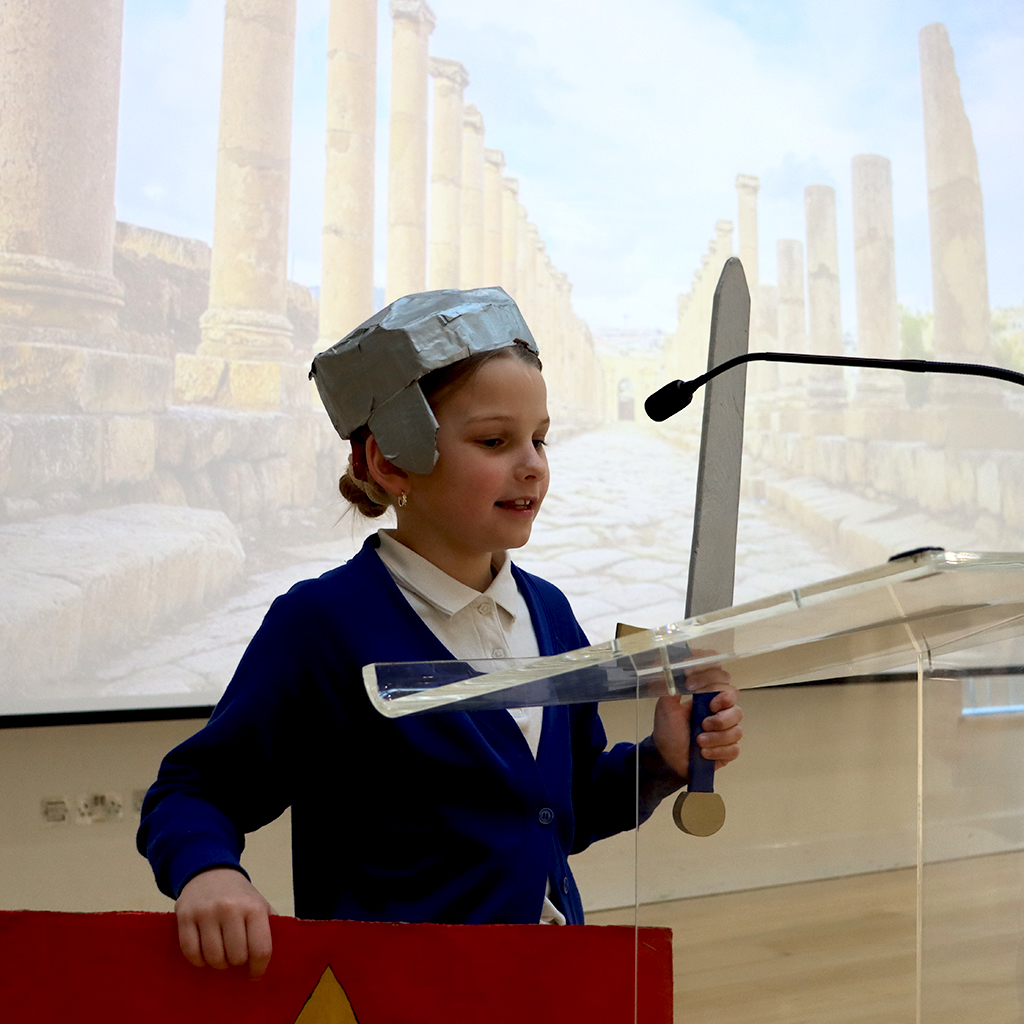
- Develop expressive skills through dance performances and storytelling.
- Use tone, pace, and gesture to enhance dramatic effect in class presentations.
- Explore historical and fictional characters through role play and podcasts.
- Dress up and participate in themed events such as Mayan Day, bringing history to life.
- Present ideas clearly and confidently to the class and wider audiences.
- Practise active listening and respond thoughtfully to questions and feedback.
- Rehearse and perform in the Harvest Festival, learning choreography and stage directions.
- Work collaboratively to present creative work to an audience.
Year 4
In Year 4, pupils step into more prominent performance roles, taking the lead in the Harvest Festival and performing confidently on stage in front of parents and the wider school community. They further develop their creative and collaborative skills by producing their own “Horrible Histories” episodes focused on the Vile Victorians, using the school’s TV studio to script, act, and record their work. These projects encourage children to work together, share ideas, and take responsibility for different aspects of production, from writing scripts to performing and filming. Through these experiences, pupils build confidence in public speaking, teamwork, and dramatic storytelling, learning how to engage an audience and communicate effectively. Regular opportunities to present work and ideas to their peers help children refine their speaking and listening skills, as well as their ability to give and receive constructive feedback. By the end of the year, pupils are more self-assured performers, able to collaborate creatively and present their learning in a variety of formats.
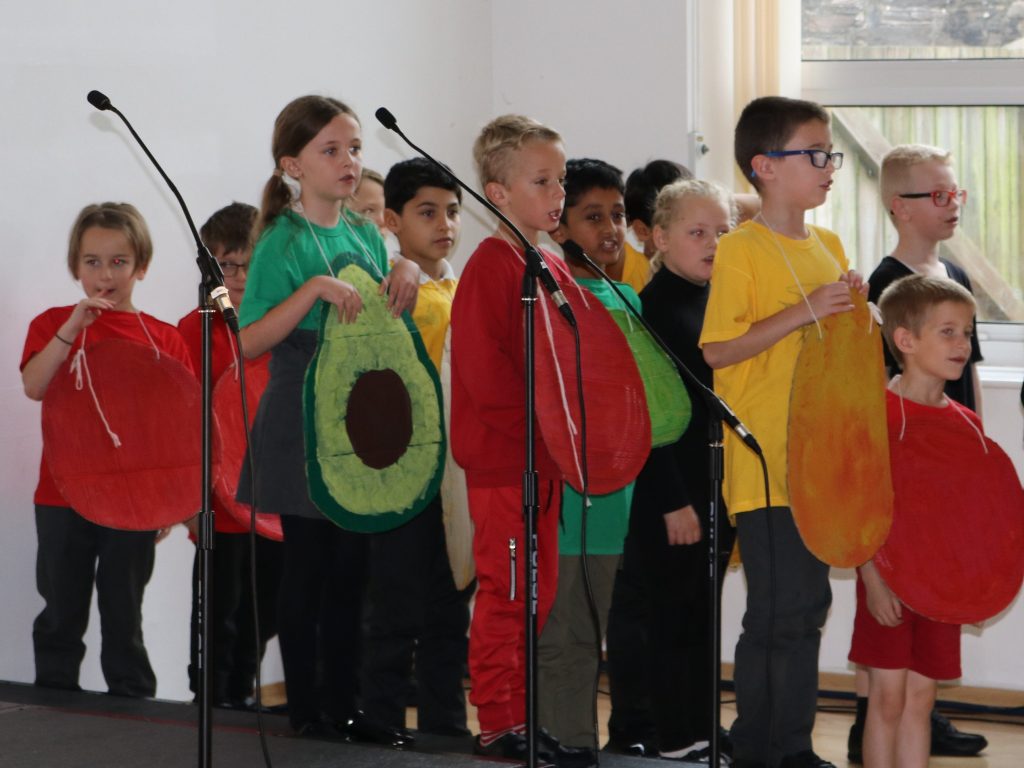
- Take on prominent roles in stage performances, such as the Harvest Festival.
- Develop expressive skills through dramatic storytelling and TV studio projects.
- Script, act, and record episodes (e.g. “Horrible Histories”) based on historical themes.
- Dress up and participate in Victorian Day, experiencing life as a Vile Victorian.
- Build confidence in public speaking and dramatic performance.
- Refine speaking and listening skills through regular presentations and feedback.
- Lead school performances for parents and the community, including the Harvest Festival.
- Present creative work in a variety of formats, including live and recorded media.
Year 5
Year 5 is a drama-rich year, offering pupils a wealth of opportunities to develop their performance and presentation skills. Working in groups, children rehearse and stage Shakespeare plays and Cautionary Tales at a local theatre, collaborating with other schools in the trust to perform for a wider audience. Drama workshops throughout the year help pupils refine their acting, stagecraft, and confidence, preparing them for these major events. In the summer term, pupils visit local heritage sites, where they research, write their own scripts, and perform historical re-enactments for parents through promenade theatre, bringing history to life in creative and engaging ways. These experiences encourage teamwork, creativity, and resilience, as children learn to communicate effectively, adapt to new roles, and respond to feedback. By the end of Year 5, pupils have developed a strong foundation in dramatic performance, public speaking, and collaborative presentation, ready for the challenges of Year 6 and beyond.

- Develop acting and stagecraft through drama workshops and theatre performances.
- Express ideas and emotions through scripted and improvised drama.
- Work in groups to rehearse and perform Shakespeare plays and Cautionary Tales.
- Write and perform historical re-enactments at heritage sites.
- Present confidently to large audiences, including parents and other schools.
- Collaborate and communicate effectively in group performances.
- Take part in the Christmas Carol Service as singers.
- Participate in promenade theatre and summer drama events.
Year 6
In Year 6, pupils have the opportunity to showcase their talents in a variety of high-profile performance settings. During the Christmas Carol Service, children sing and perform a play at a local church, developing their confidence and stage presence in front of a large audience. Throughout the year, pupils can join Musical Theatre clubs, which are open to both Year 5 and Year 6, allowing them to rehearse and perform in memorable summer shows that celebrate their creativity and teamwork. These experiences encourage children to work collaboratively, take on leadership roles, and support one another in achieving shared goals. Regular opportunities to present and perform help pupils refine their speaking, listening, and dramatic skills, while also building resilience and adaptability. By the end of Year 6, children are able to celebrate their achievements with the wider school community, leaving them well-prepared for future performance opportunities in secondary school and beyond.
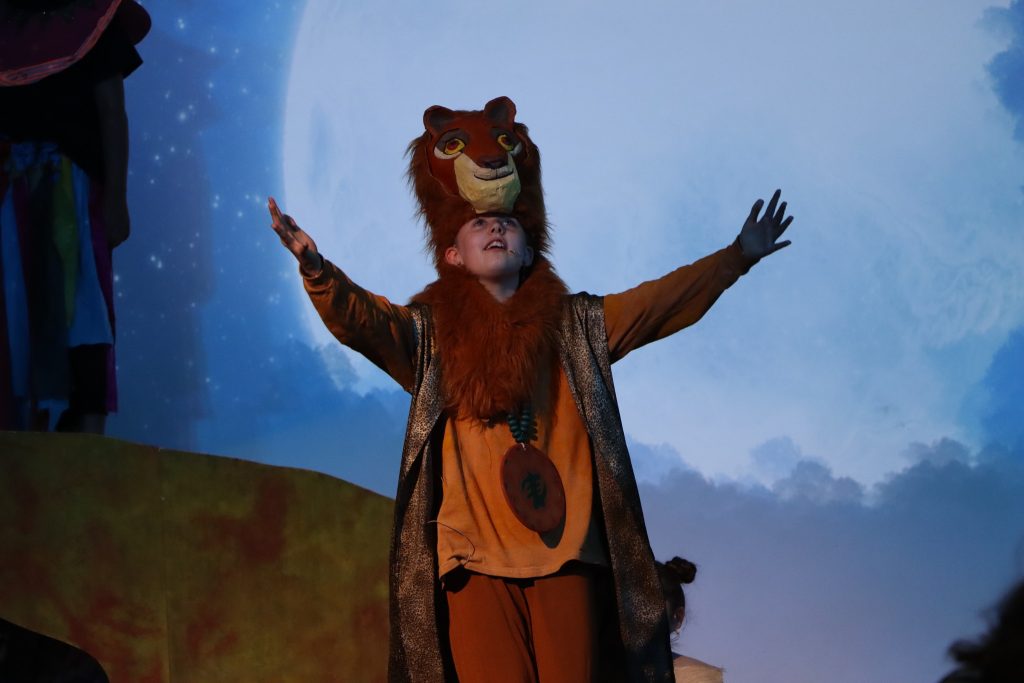
- Showcase talents in high-profile events such as the Christmas Carol Service and summer shows.
- Develop musical theatre skills through clubs and performances.
- Take on leadership roles in collaborative performances.
- Perform in plays and musical productions for the wider school community.
- Refine public speaking, singing, and dramatic skills for large audiences.
- Support and encourage peers in group presentations and performances.
- Participate in church-based performances and end-of-year shows.
- Celebrate achievements and creativity with the school and local community.
Contact: admin@tcat.education
Phone: 01392 304040
© The Cornerstone Academy Trust 2025



